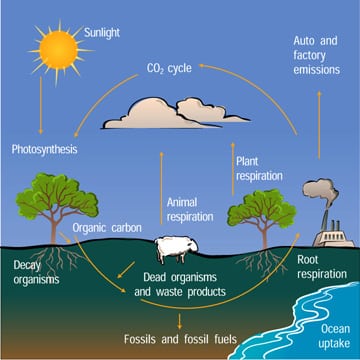The Earth’s climate is always changing, fluctuating from cool temperatures to warm temperatures throughout Earth History. Climate change has become a controversial issue that scientists are sceptical about. The present cause of global warming is part of a natural variation; however  it is also greatly caused by human actions. Based on the evidence that I have obtained, climate warming is not beneficial to human societies. Although the economic costs of reducing anthropogenic carbon emissions to the atmosphere would be too great and ‘business as usual’ is understandable to occur, that shouldn’t be the way society reacts because of the outcome it would lead to in the long run.
it is also greatly caused by human actions. Based on the evidence that I have obtained, climate warming is not beneficial to human societies. Although the economic costs of reducing anthropogenic carbon emissions to the atmosphere would be too great and ‘business as usual’ is understandable to occur, that shouldn’t be the way society reacts because of the outcome it would lead to in the long run.
What makes a difference in the Earth’s climate change in the past compared to now is the increase of the rate at which this is occurring. During the 1960’s, data showed the time that a change might occur would require to be hundreds of years. These natural causes that have had a big impact on this issue include continental drift separating landmasses and causing a change in the flow of ocean and wind currents, as well as hurricanes, and volcanoes that release gases and ash into the atmosphere. However, the 1970’s brought proof that the global climate could rapidly increase by 0.55˚C within a century, due to the growth and improvement of industrialization (Climate Change, 2007). Fossil fuels have become relied on for many things, from driving our cars, to heating homes, and producing products in factories. Combustion of these fuels is proved to be considered as the largest contributing factor to the greenhouse effect, due to its result of air pollution, water pollution, land degradation, which all have an impact of the rise of the global temperature (What Causes Climate Change, 2010).
Global warming will not be beneficial to human societies for a variety of reasons. First of all climate warming will result in warmer winters, and scientists conclude that deaths caused by heat waves are expected to be approximately five times as great as the average amount of winter deaths (Positives and Negatives of Global Warming, 2010). The increased temperature will also encourage migration of disease bearing insects, like mosquitoes. Not only will they increase the spread of West-Nile and Malaria to human societies, but they also affect animals like caribou that are currently losing a tablespoon of blood due to mosquitoes each day. This rising climate will cause humans (and caribous) to not adapt fast enough, and a decline in their overall population (Strange Days on Planet Earth, 2005).
It is reasonable to say that the economic costs of reducing anthropogenic carbon emissions are too great, because the purpose of a business is to make money, and reducing carbon emissions would require regulations on factory productions and use of electricity, as well as new and more energy efficient equipment. The cost to improve this would ultimately fall to the consumers who will be paying more for the business to re-invest in themselves again. ‘Business as usual’ is a more realistic probability since the costs to improve this issue will have no real economic benefit to the companies; it will only make the economy lose money. This may not affect our society as much now, but if these trends continue to occur then making money will be less of an issue than saving the only thing that will keep society alive; the Earth.
The sceptical subjects put forth by climate change scientists about the cause of global warming, the effects on humans, and the amount of economic costs it would take to reduce carbon emissions are all increasing with the development of the Earth. The climate is changing rapidly due to a growing economy; humans are being more greatly affected, and as the issues become worse, the cost to reduce them gets higher. These continuing trends are making the cost outweigh the incentive to reduce carbon emissions, but it should be the other way around since you cannot put a price on the Earth.
References
IPCC, 2007: Climate Change 2007: The Physical Science Basis. Contribution of Working Group I to the Fourth Assessment Report of the Intergovernmental Panel on Climate Change [Solomon, S., D. Qin, M. Manning, Z. Chen, M. Marquis, K.B. Averyt, M.Tignor and H.L. Miller (eds.)]. Cambridge University Press, Cambridge, United Kingdom and New York, NY, USA.
“Positives and negatives of global warming.” Skeptical Science: Examining Global Warming Skepticism. 15 Nov. 2010 <http://www.skepticalscience.com/global-warming-positives-negatives.htm>.
Strange Days On Planet Earth; Episode 2, The One Degree Factor (2005; NGHT)
“What causes climate change?” Climate Change Connection – Home page. 15 Nov. 2010 <http://www.climatechangeconnection.org/science/Climate_causes.htm>.
